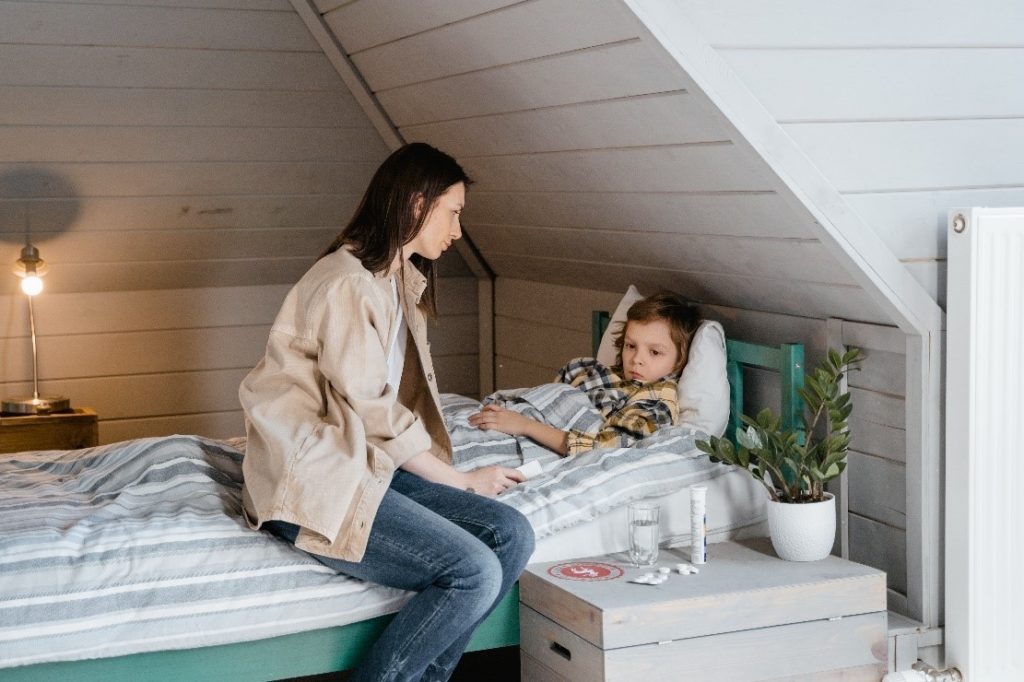For Parents
Key Points
- Learning about IBD can help you better understand what your child is going through, so you can support and advocate for them more effectively.
- Allow your child the time and space to ask you or their healthcare professional questions.
- Your child might only want you to tell people who need to know, such as teachers or other people who look after them. Have a conversation with your child to find out what level of detail you need to include.
How to talk to your child about IBD
Feeling sad, worried or scared are all normal feelings when receiving a diagnosis or living with the uncertainty of inflammatory bowel disease (IBD) and can affect the whole family, not just the person with the condition. Just remember, IBD can be well managed to support a great life.
Learning about IBD can help you better understand what your child is going through, so you can support and advocate for them more effectively.

Talking about symptoms, tests and procedures
Developing an understanding of the symptoms, tests and treatments prescribed for your child will help you respond to questions your child might have on these topics.
Start by talking to your child’s gastroenterologist. Make a list of questions you’d like to ask and bring them to your child’s next appointment or email the list of questions through to the service.

The information you share with your child about their condition will depend on their age. Allow your child the time and space to ask you or their healthcare professional questions. Refer to trusted sources of information, like Crohn’s & Colitis Australia (CCA) or government health websites if you don’t have the answers, rather than googling from unknown sources.
Visit the CCA resources for kids (under 12 years) or young people (teens aged 12–18 years). This may be a good starting point for your conversations.
Supporting your child
Whether it be letting your child sleep in, preparing nutritious snacks, or celebrating small wins, you may find yourself looking for new ways to support your child since receiving their diagnosis. Supporting your child might be as simple as asking them “what do you need from me today?”

Here are some tips on how you can support your child:
- Listen to their concerns. Living with a chronic condition can bring up a lot of difficult emotions for your child. Be honest with them when they ask questions and listen to their concerns. Let them know you are on their side and ask them what they need from you right now.
- Reassure your child that there are options to help them manage their IBD well so they can live a great life and that you will all get through the difficult times, together, as a family.
- Communicate with your child’s school. Talk to your child’s teacher, school principal or school nurse to make a plan for your child. The school may be able to accommodate your child with access to a private bathroom, extra time for exams, a plan for catching up on any missed schoolwork or be able to provide extra emotional support. Students can complete forms for medical special consideration in Year 11 and 12 state exams. Be sure to include your child in any decisions. You can also share our resource for schools and teachers on supporting students with IBD.
- Find opportunities for your child to connect with other children living with IBD. Peer-to-peer support can help your child to know that they are not alone and provide them with a source of comfort. Whether it’s a day out or camp, an online support group or a bond built in the clinic waiting area, keep an eye out for new opportunities for your child to connect with others. Ask your child’s healthcare team about peer-support resources and events. Peer support can be important for children living in rural and regional areas to connect with other children living with IBD locally or nationally.
- Create a network of support for your child. Your child may not want everyone to know about their condition, but it helps to have a few key people in their life that they can turn to for support. Whether it’s grandparents, a teacher, family friend or cousin, start by asking your child who they want in their support team. You can then have an informal chat with each person and direct them to the CCA website if they have more questions on how they can best support your child.
- Look after yourself. Make your own health and wellbeing a priority. A diagnosis of IBD can be difficult for any member of the family, let alone the person it affects. Reach out if you need emotional support and look for opportunities to connect with other parents who understand what you are going through.
Further information
- Learn more about nutrition and dietary strategies for IBD
- Learn more about IBD for kids
- Read stories about other people and their experience with IBD
- Find a support group near you
- Learn more about IBD unclassified
- Learn more about workplace
- Learn more about financials
- Learn more about supporting someone with IBD
Talking to others about your child’s IBD
Children and teens may worry about telling others about their condition and as parents we sometimes don’t ask our children what they want people to know and what they want us to say.
Start by having a conversation with your child to find out what level of detail you need to include when talking to specific people. Your child might only want you to tell people who need to know, such as teachers or other people who look after them.
When you might need to talk about your child’s IBD
Whether you’re talking to a parent when you drop your child off at a birthday party or sitting down in a more formal meeting with your child’s teacher, it is a good idea to identify some specific situations when you will need to share information about your child’s health.

What to say
It’s a good idea to prepare a script that covers the most important and practical needs of your child.
Sample script
Before I go there’s a couple of things, I need to let you know about [child’s name].
He/she/they doesn’t/don’t like to make a big fuss about it, but sometimes they experience [insert relevant symptoms] (optional: because of [insert diagnosis]).
Or
This means they need to take this medication at [specific time].
Or
This means he/she/they might need to dash to the bathroom, do you mind pointing it out just in case he/she needs it in a hurry?
He/she/they is really good at taking care of themselves and knowing when they are starting to feel sick (optional: but might need you to check in on them occasionally).
If you are worried or [child’s name] complains of [insert warning symptom] please call me on [insert number].
Further information


12-17 year olds can now join our new platform to chat about their experiences with IBD and bond with other young people over fun activities, all while learning more about IBD.